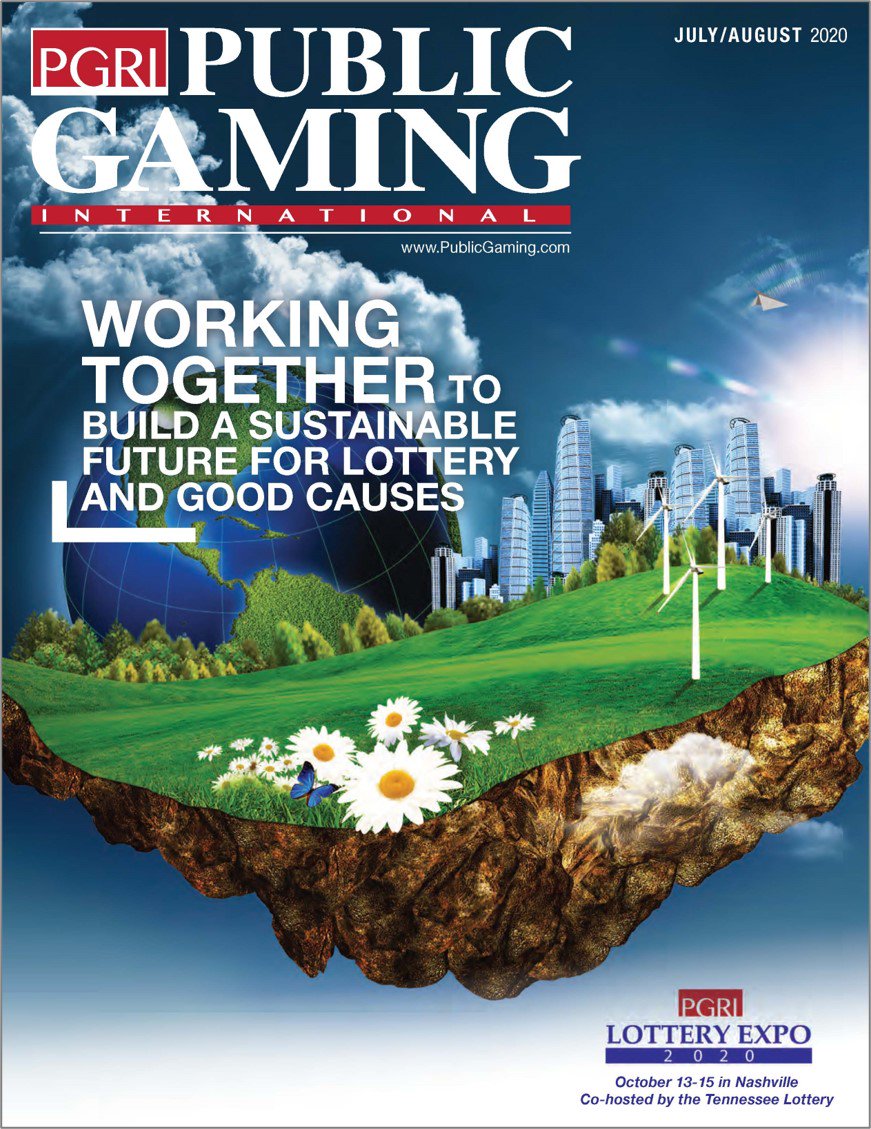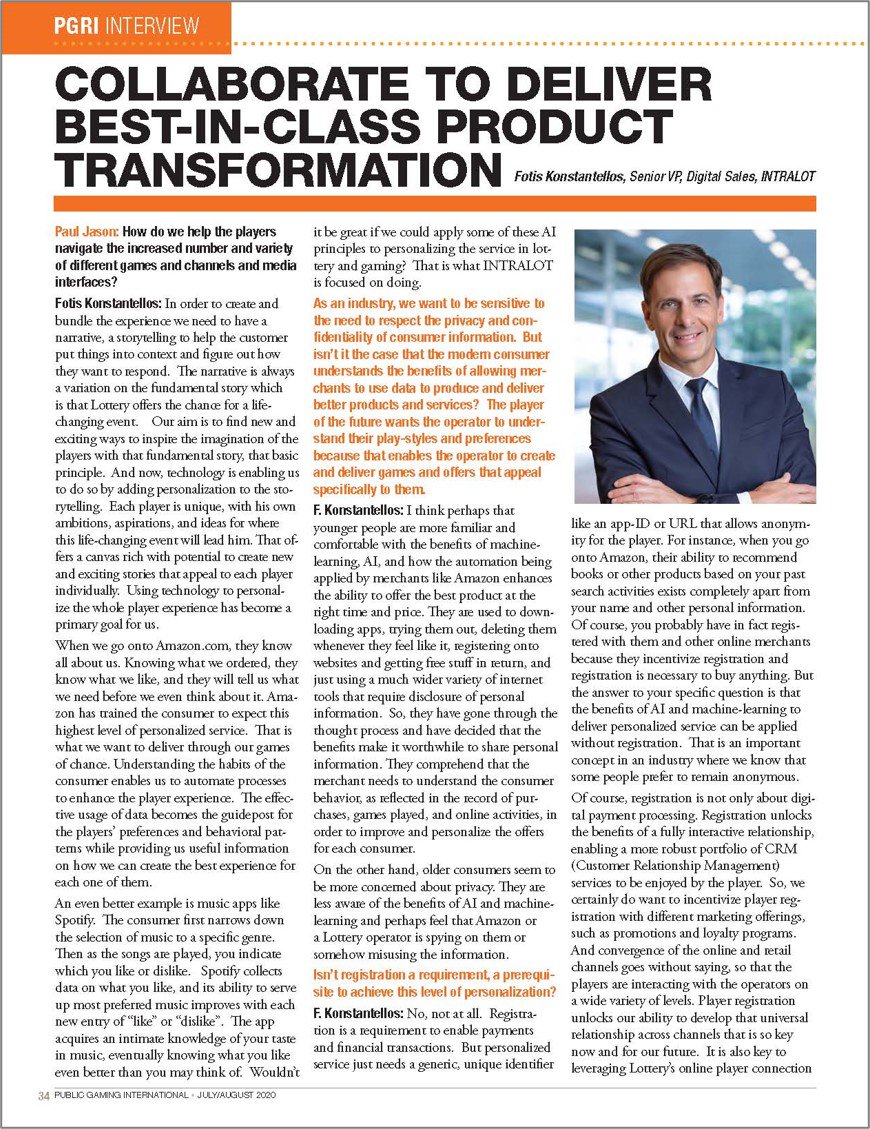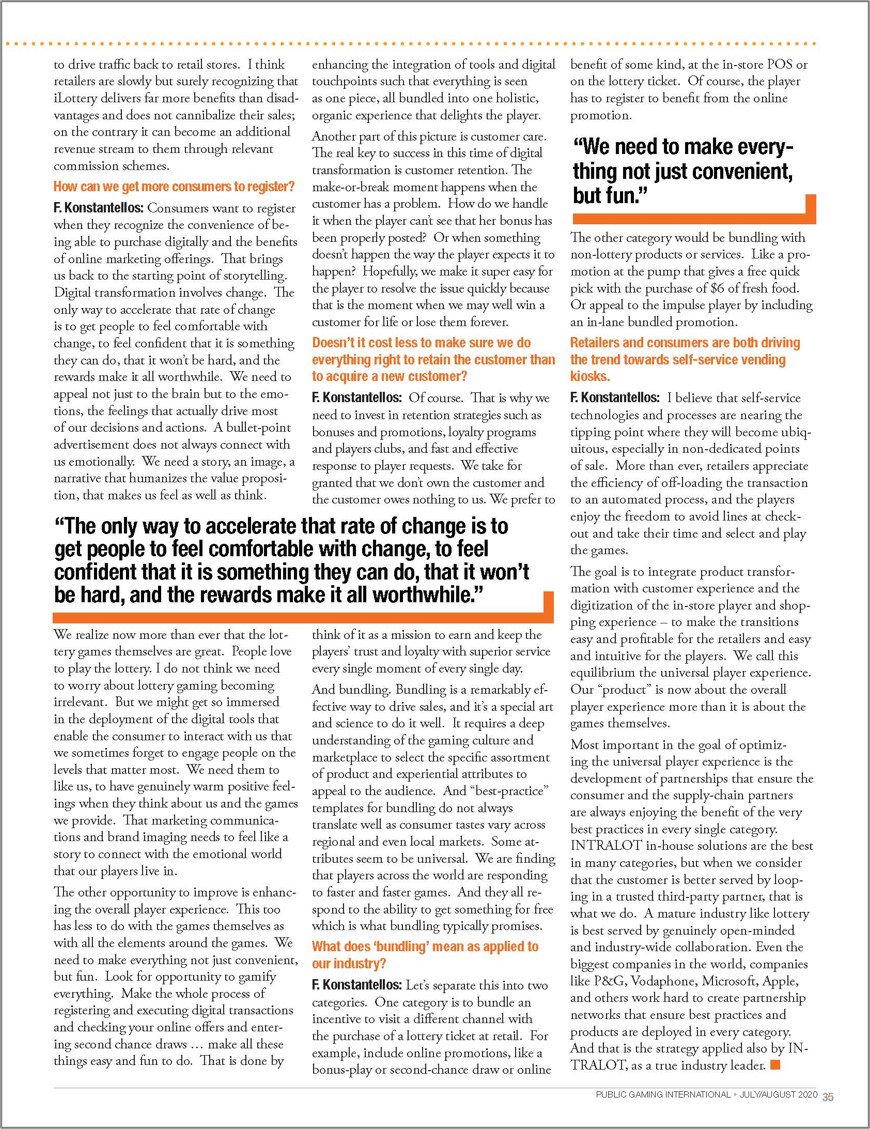Interview | Fotis Konstantellos, Senior VP, Digital Sales, INTRALOT at PGRI Magazine July/August 2020



Collaborate to deliver best-in-class Product Transformation
Paul Jason: How do we help the players navigate the increased number and variety of different games and channels and media interfaces?
Fotis Konstantellos: In order to create and bundle the experience we need to have a narrative, a storytelling to help the customer put things into context and figure out how they want to respond. The narrative is always a variation on the fundamental story which is that Lottery offers the chance for a life-changing event. Our aim is to find new and exciting ways to inspire the imagination of the players with that fundamental story, that basic principle. And now, technology is enabling us to do so by adding personalization to the storytelling. Each player is unique, with his own ambitions, aspirations, and ideas for where this life-changing event will lead him. That offers a canvas rich with potential to create new and exciting stories that appeal to each player individually. Using technology to personalize the whole player experience has become a primary goal for us.
When we go onto Amazon.com, they know all about us. Knowing what we ordered, they know what we like, and they will tell us what we need before we even think about it. Amazon has trained the consumer to expect this highest level of personalized service. That is what we want to deliver through our games of chance. Understanding the habits of the consumer enables us to automate processes to enhance the player experience. The effective usage of data becomes the guidepost for the players’ preferences and behavioral patterns while providing us useful information on how we can create the best experience for each one of them.
An even better example is music apps like Spotify. The consumer first narrows down the selection of music to a specific genre. Then as the songs are played, you indicate which you like or dislike. Spotify collects data on what you like, and its ability to serve up most preferred music improves with each new entry of “like” or “dislike”. The app acquires an intimate knowledge of your taste in music, eventually knowing what you like even better than you may think of. Wouldn’t it be great if we could apply some of these AI principles to personalizing the service in lottery and gaming? That is what INTRALOT is focused on doing.
As an industry, we want to be sensitive to the need to respect the privacy and confidentiality of consumer information. But isn’t it the case that the modern consumer understands the benefits of allowing merchants to use data to produce and deliver better products and services? The player of the future wants the operator to understand their play-styles and preferences because that enables the operator to create and deliver games and offers that appeal specifically to them.
F. Konstantellos: I think perhaps that younger people are more familiar and comfortable with the benefits of machine-learning, AI, and how the automation being applied by merchants like Amazon enhances the ability to offer the best product at the right time and price. They are used to downloading apps, trying them out, deleting them whenever they feel like it, registering onto websites and getting free stuff in return, and just using a much wider variety of internet tools that require disclosure of personal information. So, they have gone through the thought process and have decided that the benefits make it worthwhile to share personal information. They comprehend that the merchant needs to understand the consumer behavior, as reflected in the record of purchases, games played, and online activities, in order to improve and personalize the offers for each consumer.
On the other hand, older consumers seem to be more concerned about privacy. They are less aware of the benefits of AI and machine-learning and perhaps feel that Amazon or a Lottery operator is spying on them or somehow misusing the information.
Isn’t registration a requirement, a prerequisite to achieve this level of personalization?
F. Konstantellos: No, not at all. Registration is a requirement to enable payments and financial transactions. But personalized service just needs a generic, unique identifier like an app-ID or URL that allows anonymity for the player. For instance, when you go onto Amazon, their ability to recommend books or other products based on your past search activities exists completely apart from your name and other personal information. Of course, you probably have in fact registered with them and other online merchants because they incentivize registration and registration is necessary to buy anything. But the answer to your specific question is that the benefits of AI and machine-learning to deliver personalized service can be applied without registration. That is an important concept in an industry where we know that some people prefer to remain anonymous.
Of course, registration is not only about digital payment processing. Registration unlocks the benefits of a fully interactive relationship, enabling a more robust portfolio of CRM (Customer Relationship Management) services to be enjoyed by the player. So, we certainly do want to incentivize player registration with different marketing offerings, such as promotions and loyalty programs. And convergence of the online and retail channels goes without saying, so that the players are interacting with the operators on a wide variety of levels. Player registration unlocks our ability to develop that universal relationship across channels that is so key now and for our future. It is also key to leveraging Lottery’s online player connection to drive traffic back to retail stores. I think retailers are slowly but surely recognizing that iLottery delivers far more benefits than disadvantages and does not cannibalize their sales; on the contrary it can become an additional revenue stream to them through relevant commission schemes.
How can we get more consumers to register?
F. Konstantellos: Consumers want to register when they recognize the convenience of being able to purchase digitally and the benefits of online marketing offerings. That brings us back to the starting point of storytelling. Digital transformation involves change. The only way to accelerate that rate of change is to get people to feel comfortable with change, to feel confident that it is something they can do, that it won’t be hard, and the rewards make it all worthwhile. We need to appeal not just to the brain but to the emotions, the feelings that actually drive most of our decisions and actions. A bullet-point advertisement does not always connect with us emotionally. We need a story, an image, a narrative that humanizes the value proposition, that makes us feel as well as think.
We realize now more than ever that the lottery games themselves are great. People love to play the lottery. I do not think we need to worry about lottery gaming becoming irrelevant. But we might get so immersed in the deployment of the digital tools that enable the consumer to interact with us that we sometimes forget to engage people on the levels that matter most. We need them to like us, to have genuinely warm positive feelings when they think about us and the games we provide. That marketing communications and brand imaging needs to feel like a story to connect with the emotional world that our players live in.
The other opportunity to improve is enhancing the overall player experience. This too has less to do with the games themselves as with all the elements around the games. We need to make everything not just convenient, but fun. Look for opportunity to gamify everything. Make the whole process of registering and executing digital transactions and checking your online offers and entering second chance draws … make all these things easy and fun to do. That is done by enhancing the integration of tools and digital touchpoints such that everything is seen as one piece, all bundled into one holistic, organic experience that delights the player.
Another part of this picture is customer care. The real key to success in this time of digital transformation is customer retention. The make-or-break moment happens when the customer has a problem. How do we handle it when the player can’t see that her bonus has been properly posted? Or when something doesn’t happen the way the player expects it to happen? Hopefully, we make it super easy for the player to resolve the issue quickly because that is the moment when we may well win a customer for life or lose them forever.
Doesn’t it cost less to make sure we do everything right to retain the customer than to acquire a new customer?
F. Konstantellos: Of course. That is why we need to invest in retention strategies such as bonuses and promotions, loyalty programs and players clubs, and fast and effective response to player requests. We take for granted that we don’t own the customer and the customer owes nothing to us. We prefer to think of it as a mission to earn and keep the players’ trust and loyalty with superior service every single moment of every single day.
And bundling. Bundling is a remarkably effective way to drive sales, and it’s a special art and science to do it well. It requires a deep understanding of the gaming culture and marketplace to select the specific assortment of product and experiential attributes to appeal to the audience. And “best-practice” templates for bundling do not always translate well as consumer tastes vary across regional and even local markets. Some attributes seem to be universal. We are finding that players across the world are responding to faster and faster games. And they all respond to the ability to get something for free which is what bundling typically promises.
What does ‘bundling’ mean as applied to our industry?
F. Konstantellos: Let’s separate this into two categories. One category is to bundle an incentive to visit a different channel with the purchase of a lottery ticket at retail. For example, include online promotions, like a bonus-play or second-chance draw or online benefit of some kind, at the in-store POS or on the lottery ticket. Of course, the player has to register to benefit from the online promotion.
The other category would be bundling with non-lottery products or services. Like a promotion at the pump that gives a free quick pick with the purchase of $6 of fresh food. Or appeal to the impulse player by including an in-lane bundled promotion.
Retailers and consumers are both driving the trend towards self-service vending kiosks.
F. Konstantellos: I believe that self-service technologies and processes are nearing the tipping point where they will become ubiquitous, especially in non-dedicated points of sale. More than ever, retailers appreciate the efficiency of off-loading the transaction to an automated process, and the players enjoy the freedom to avoid lines at check-out and take their time and select and play the games.
The goal is to integrate product transformation with customer experience and the digitization of the in-store player and shopping experience – to make the transitions easy and profitable for the retailers and easy and intuitive for the players. We call this equilibrium the universal player experience. Our “product” is now about the overall player experience more than it is about the games themselves.
Most important in the goal of optimizing the universal player experience is the development of partnerships that ensure the consumer and the supply-chain partners are always enjoying the benefit of the very best practices in every single category. INTRALOT in-house solutions are the best in many categories, but when we consider that the customer is better served by looping in a trusted third-party partner, that is what we do. A mature industry like lottery is best served by genuinely open-minded and industry-wide collaboration. Even the biggest companies in the world, companies like P&G, Vodaphone, Microsoft, Apple, and others work hard to create partnership networks that ensure best practices and products are deployed in every category. And that is the strategy applied also by INTRALOT, as a true industry leader.
